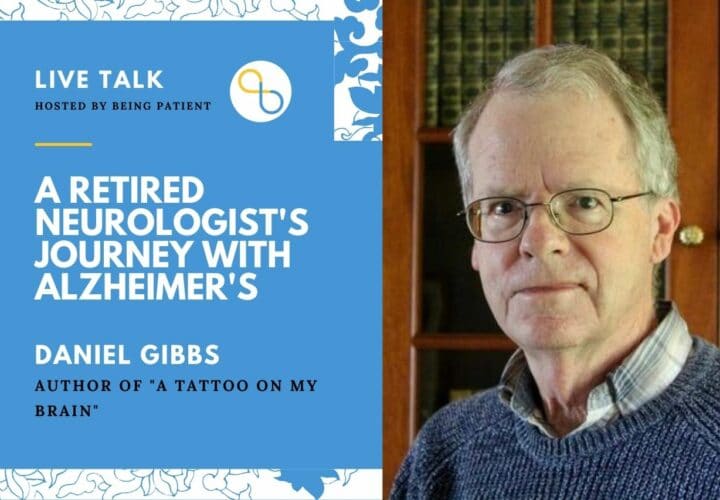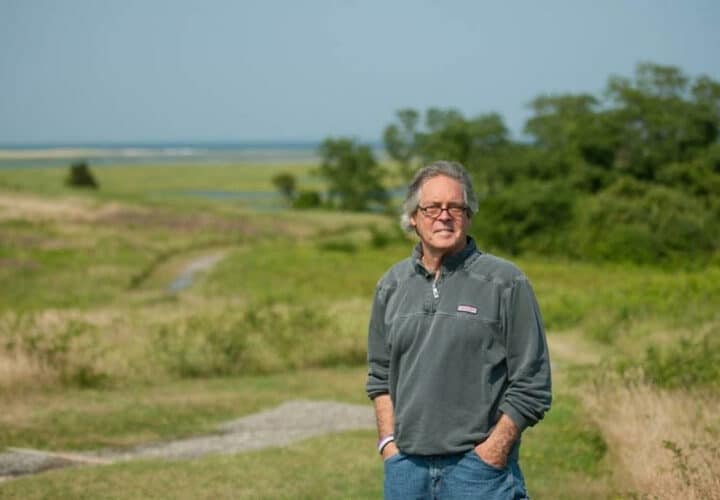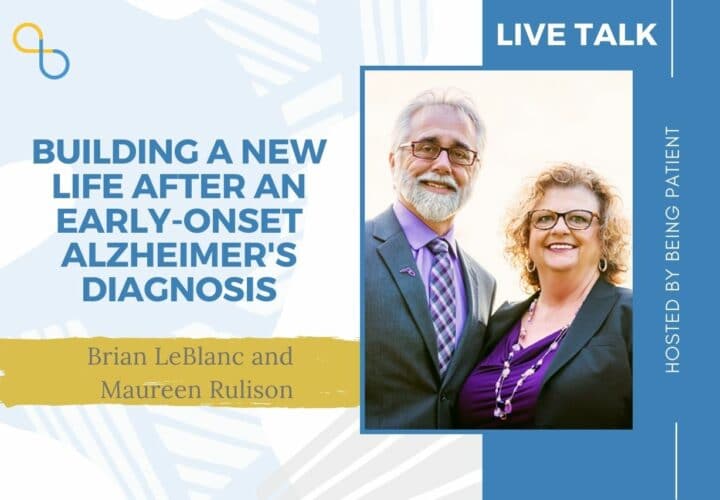For retired neurologist Daniel Gibbs, an Alzheimer’s diagnosis gave him not only a sense of relief, but a new lifestyle: one of healthier living, Alzheimer’s advocacy, and savoring life’s little pleasures.
This conversation is part of Being Patient’s LiveTalk with Gibbs.
A brain-imaging study revealed the hallmarks of Alzheimer’s in Daniel Gibbs’ brain: signs of atrophy along with abnormal beta-amyloid and tau proteins.
The results would be a frightening revelation for some people. But in many ways, the brain scans offered Gibbs, a retired neurologist, clarity and reassurance. A diagnosis of early-stage Alzheimer’s opened a window of opportunity to not only slow the progression of a disease he had spent so much of his career diagnosing in others, but also to participate in Alzheimer’s research as a subject.
Being Patient spoke with Gibbs, author of A Tattoo on My Brain, about his insights into life after a diagnosis, and his strategies for preserving brain health and living well with Alzheimer’s.
Being Patient: What symptoms do you experience day-to-day?
Daniel Gibbs: I’m easily flustered. I can still balance the checkbook but if anything goes wrong, I just get very flustered about it. I can’t multitask. The prefrontal lobe controls our ability to make plans and to organize ourselves. That’s damaged in many people with Alzheimer’s early on and mine certainly is on the PET scans.
I have much harder times being in groups. I can’t screen out other conversations to listen to one. When I’m at even a family gathering, I tend to just zone out because I have a hard time following the thread of conversations.
“Who knows what the future brings.
It doesn’t really do you any good
to dwell on the future. Just dwell on what
you can do now, and enjoy it.”
Being Patient: In an article for the Scientific American, you wrote about your symptoms of face blindness. Why does it occur among people living with Alzheimer’s?
Daniel Gibbs: That’s a very common thing with Alzheimer’s even fairly early on. Prosopagnosia is a fairly common thing: Two percent of the population has it congenitally, but people with Alzheimer’s disease often have it. Face blindness is usually due to a problem with a specific part of the brain in the temporal lobe. Interestingly in my first tau scan, there was very little tau, just in the tip of the temporal lobe on the left primarily. Three years later it extended back into the temporal lobe just right into this area where you get face blindness. That was a nice correlate.
My face blindness is not as bad as a lot of people. I have a colleague at my former work who has congenital face blindness and she can’t recognize anybody until they speak, or has some other kind of clue. She has very severe face blindness. Oliver Sacks had very severe face blindness and he’s written about it eloquently as he did write about many neurological problems. What it is is just seeing a face and not being able to distinguish it from other faces without extra clues like hair color or clothing or the car they’re driving or the dogs they’re walking.
Being Patient: In your new book A Tattoo on My Brain, you noted that the conversation about Alzheimer’s is driven by fear and hopelessness. Why is that?
Daniel Gibbs: I don’t think it’s surprising. From a historical point of view, what we associate with Alzheimer’s is the end-stage: our grandmothers in the nursing home unable to recognize anybody, unable to communicate, being incontinent. That’s the general image of Alzheimer’s and it’s a terrifying image.
In the days that I was first practicing neurology, I would see people in moderate to severe stages of their disease. Now it’s changing. [There are] people like me who most people will not believe have Alzheimer’s. I talk to everybody about it. I talk to neighbors and I speak to medical students at OHSU, the local medical school. I talk at the Alzheimer’s Association both locally and nationally. I frequently get people who aren’t that experienced with the modern concept of Alzheimer’s [say], “How can you have Alzheimer’s? You’re so articulate” Well, maybe but maybe not, and I do have Alzheimer’s.
I think I’m probably at the end of the stage where treatment is likely to be beneficial, at least for a time. What we need to aim for is getting treatments, whether it’s lifestyle management or drugs at the earliest stages, pre-symptomatic or just when there are first symptoms. We don’t want to wait to intervene when people are in what we used to call Alzheimer’s disease because that’s too late.
“I don’t think there will be a cure in my lifetime,
but [I] slow down the progression so that I have the maximum number
of cognitively good years ahead. Hopefully, I will die of something else before
I reach the end-stage of Alzheimer’s disease. I mean that literally.
I don’t mean to be grim about it. I’m hopeful about that.”
Being Patient: At a time before donepezil (brand name Aricept) was approved, you told your patient that she most likely had Alzheimer’s, and later found out that she committed suicide. This account from your book highlighted people’s fear about Alzheimer’s: The future is frightening. How do you cope with the prospects of the later stages of Alzheimer’s?
Daniel Gibbs: I can tell you exactly what my plan is. My plan is to slow down the progression of my Alzheimer’s by doing all the lifestyle things that have been proven to have at least some effect. I don’t think there will be a cure in my lifetime, but [I] slow down the progression so that I have the maximum number of cognitively good years ahead. Hopefully, I will die of something else before I reach the end-stage of Alzheimer’s disease. I mean that literally. I don’t mean to be grim about it. I’m hopeful about that.
I don’t want to end up curled up in a nursing home at age 90 with Alzheimer’s. I would rather stay cognitively good through my 70s and maybe into my 80s. Then hopefully, something else will come but the timing has to be right.
Being Patient: Can you share with us the evidence that supports lifestyle changes for slowing the progression of Alzheimer’s?
Daniel Gibbs: The key thing, and this is the hard point for people to get on board with, is that [lifestyle changes] have to be started early. By the time you have cognitive impairment, it’s almost too late. Once you start having nerve cells die, we don’t know how to make them grow back yet. I bet you eventually we will, but that’s years down the line. What we need to do is try to prevent that from happening.
I like to think of management of Alzheimer’s now as more of a preventative therapy than curative. [There have been] multiple studies done [for aerobic exercise]. If it’s started in midlife, there could be a 30 percent to 50 percent reduction in the rate of progression of Alzheimer’s or the risk of getting clinical Alzheimer’s. That’s huge. If we had a drug that did that, it would certainly be better than aducanumab and probably better than anything to come for a while.
The evidence for [diet] is not quite as good just because there isn’t as much of it as exercise. Following a plant-based, Mediterranean style diet seems to slow the progression of Alzheimer’s by about 30 percent. That’s also huge.
The up-and-comer now is sleep. That’s really an exciting area where there needs to be more data, but it looks like it’s really important to [get] at least seven hours of sleep a night. People that get six hours or less have a much higher chance of getting dementia.
Now there’s some scientists suggesting ways that this may happen. There’s what’s called the glymphatic circulation in the brain that is most active during non-REM slow-wave sleep. Essentially, it flushes the brain of amyloid and other toxins, and whether that turns out to be real is still to be determined, but it’s really exciting.
“We may be raising the bar too far for ourselves
by talking about a cure, but if we can come up with
management that slows progression, that’s going to be huge.”
Being Patient: Social engagement is very important too, right?
Daniel Gibbs: Social engagement is particularly hard when you have Alzheimer’s because one of the almost universal thing with Alzheimer’s is apathy. That’s due to prefrontal lobe damage. It’s hard to just get motivated to do anything, and that includes social engagement.
Also, there’s the problem of the difficulty of understanding people. I have trouble understanding one person speak. If I don’t hear every single word, I can’t put them together in context anymore. Around multiple people speaking, like in a social event, it’s virtually impossible to follow what’s going on. It’s hard, but [social engagement] seems to be important.
Being Patient: As a former neurologist and a research scientist earlier in your career, are you hopeful that we’ll find a treatment to prevent Alzheimer’s?
Daniel Gibbs: Absolutely. We may be raising the bar too far for ourselves by talking about a cure, but if we can come up with management that slows progression, that’s going to be huge.
Being Patient: You wrote about savoring the moments in life. What does that mean for you personally?
Daniel Gibbs: Who knows what the future brings. It doesn’t really do you any good to dwell on the future. Just dwell on what you can do now and enjoy it. I’ve got four grandchildren in town and I see them almost every day. The pandemic is easing down. [I’m] starting to get together with friends more. I’m going hiking with one of my friend Henry who taught me about Beacon Rock. Enjoy the moment and live in it.
Being Patient: What do you hope healthcare professionals could take away from your book and experience?
Daniel Gibbs: For healthcare professionals, there’s a big problem — and it’s not their fault particularly because medicine has become so busy and time-driven — that most general care physicians don’t have time to listen to people talk.
I wish that physicians, if they don’t have time to engage with Alzheimer’s patients, at the very least use the referral service of the Alzheimer’s Association because they have a huge outreach program to people with Alzheimer’s in terms of education, [support groups], and a 24/7 call line. I don’t think a lot of physicians recognize that that is out there. Part of what I’ve been trying to do locally with the Alzheimer’s Association is help get that word out to physicians.
Being Patient: What’s your message for people with Alzheimer’s and their families?
Daniel Gibbs: I really can’t speak from experience on the late stages yet because I’m not there. But I’m still enjoying life. [Being] an advocate for Alzheimer’s disease really makes me feel good, and I think that’s very helpful for fighting my disease and fighting the apathy. I’ve been doing interviews almost every day and I enjoy that.
[For] people with a family history of Alzheimer’s — a parent, or worse, two parents with Alzheimer’s or your sibling with Alzheimer’s — it’s really important that they start doing something early even if they have no symptoms. Get going on the exercise. Start watching their diet. Consider volunteering for a study because more and more work is going to be looking for people in the pre-symptomatic stage of Alzheimer’s disease, and they’re going to be really hard to find.
The first response I got from my book was an email I got from a guy in Scotland, who said that the day he finished my book, he volunteered for an Alzheimer’s study. That just made me feel great because that’s the message I’m trying to get out there.
Check out part I of Being Patient’s LiveTalk with Gibbs about Aduhelm’s approval and his experience as a former clinical trial participant of the Alzheimer’s drug.
The interview has been edited for length and clarity.
Contact Nicholas Chan at nicholas@beingpatient.com




i enjoyed dr gibbs interview. his story is so similar to mine. i am a family physician who retired due to my diagnosis. i am in the aducanumab study also. it is being reactivated now at ucla. i have not had aria. like dr gibbs i do interviews and presentations on alzheimers. like him my moca score is now 28-30. i look forward to reading his book. thanks to him for sharing his story and thanks to being patient for providing us with regular information on alzheimers disease.
I want to thank Dr Gibbs for his book, A Tattoo on my Brain. Reading it has profoundly changed my life. Prior to the book, all I read was about the painful struggles of caregivers. I never knew anyone else with dementia felt like I do. I feel truly sad for caregivers and do not want those I love to take on that role as I decline. Thank you Dr Gibbs!
I have been taking Aricept for about 24 years. I had a traumatic brain injury in 1995 and was able to do outpatient therapy to work on strategies to help get on with my life.Aricept was prescribed as possibly being helpful and I have been taking it unsupervised but prescribed by my primary doc. Here in Oregon. Good or bad idea? I’m afraid to stop but also of long term consequences. Thoughts or guidance would be greatly appreciated.
Hi
Odd that you make no mention of supplements or medecines
Is there any pill or supplement that helps do you think
I mean for me ! I m 75 and have some symptoms….